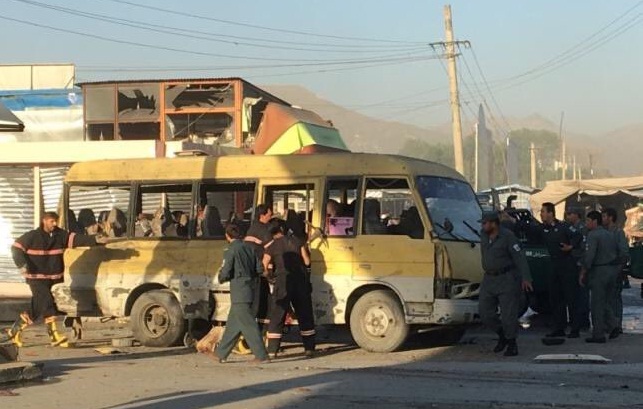AT-KABUL: In a report released on Friday, the US Special Inspector General for Afghanistan (SIGAR) said that high-profile attacks in Kabul City decreased by 41 percent as compared to the same period of 2015.
Referring to the statistics of the United States Department of Defense, the special inspector general said that Kabul City has experienced 10 high-profile attacks between December 1, 2015, and May 20, 2016, with 50 others across the rest of the country. “This represents a 41% decrease in high-profile attacks in Kabul compared to 26 during the same period a year earlier,” the report highlights.
The report suggests that a sign of the growing insecurity in Kabul are the increasing number of concrete blast walls that surround “government buildings, foreign embassies, companies, and the homes of wealthy residents.”
This month, local media reported 17 percent decrease in insurgent attacks in the country as Afghan and coalition forces have brought intensity in airstrikes against the militant groups, including the Taliban and Daesh. Backed by the US-led coalition forces, Afghan National Defense and Security Forces (ANDSF) launched a large-scale operation in Kot district of eastern Nangarhar province to defeat Daesh. The terrorist group torched 90 homes of the dwellers as the locals supported Afghan security forces.
According to the report, the Taliban have been exceptionally active in 2016, particularly after launching their annual spring offensive ‘Operation Omari’. “This year, the campaign has largely overlooked civilian government targets, instead focusing on district administrative centers and the strategically important parts of Uruzgan Province along the Kandahar-Tirin Kot highway and Baghlan Province,” SIGAR pointed out.
The report also sheds light on growing insecurity in the country. Regarding the peace talks, the SIGAR report said that the ongoing effort to reach a peace agreement with the Taliban has stagnated, with the Taliban intending not to participate in any peace talks until their demands are met by the Afghan government and its international supporters.
“Moreover, Mullah Mansour’s death shuffled Taliban leadership, exacerbated infighting, and left the future of the peace process uncertain. The Afghan government experienced some success with the Hezb-e-Islami insurgent group, releasing a final draft for a peace agreement that received the approval of the High Peace Council chair; although critics expressed concerns that a peace agreement may prevent some actors in Hezbe-Islami [Sic] from being held accountable for their crimes. However, by late June the peace talks had lost momentum and then completely fell through when the leader of Hezb-e-Islami, Gulbuddin Hekmatyar, withdrew entirely and called for the dissolution of the Afghan unity government,” the report indicated to the dormant peace process.
About the military operations launched by Afghan law enforcement agencies, SIGAR said that Afghan security forces have struggled to respond to the Taliban’s growing national presence. “There has been particularly stiff resistance in provinces along the border with Pakistan, such as Helmand, Kandahar, and Nangarhar, with reports that 68.5% of security incidents occur in southern, southeastern, and eastern Afghanistan.”
According to the report, several issues preventing the Afghan security forces from properly engaging the Taliban relate to “deficiencies in key areas such as command and control, leadership, logistics, and overall coordination. High attrition rates, including high casualty rates, continue to make the sustainability of the ANDSF a major concern and priority for leadership.”
A US State Department report on terrorism released in June disclosed that a number of insurgent attacks were planned and launched from safe havens in Pakistan. A Pakistani researcher with the U.S.-based Hudson Institute claims that the Taliban and terrorists are being trained at three seminaries or madrassas, in Karachi and Khyber Pakhtunkhwa (KP) province, one located near a Pakistani military facility. Pakistan Tehreek-e-Insaf, a political party led by Imran Khan, had provided 2.8 million USD to one of these seminaries, Jamia Haqqania in Akora Khattak, Nowshera district.
SIGAR said that in June, Brigadier General Cleveland provided an assessment of the security situation throughout Afghanistan. In northern Afghanistan, the ANDSF were able to repel the Taliban in Kunduz but faced “fairly serious” fighting in Baghlan. In the south, where the Taliban has shifted their main efforts, fighting did not resume in Helmand after the poppy-harvest season but is expected to later this summer. Small engagements involved roughly 50–100 Taliban fighters massing at night, hitting checkpoints, and moving out before ANDSF reinforcements could arrive. The Resolute Support (RS) is concerned about security in Uruzgan in eastern Afghanistan as the Taliban still control parts of the main road.
 Afghanistan Times
Afghanistan Times




